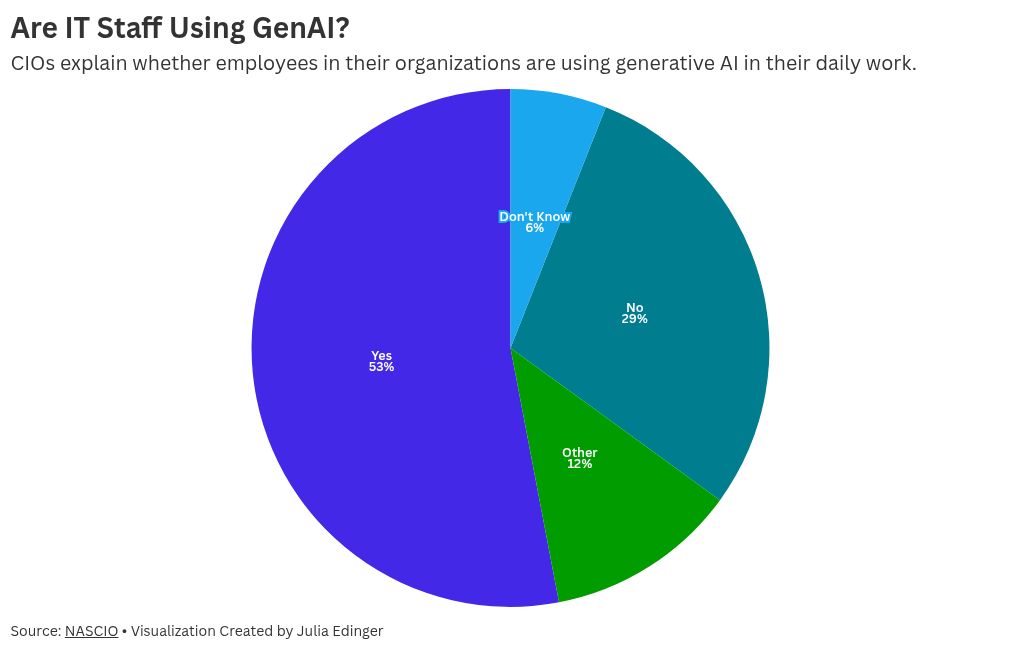A recent report by the National Association of State Chief Information Officers (NASCIO) highlights the rising influence of generative artificial intelligence (GenAI) in state government operations. Based on interviews with state CIOs and the 2024 State CIO Survey, the report, titled “Generating Opportunity: The Risks and Rewards of Generative AI in State Government,” reveals that over half of state employees are already using GenAI tools. While many states are making strides in adopting GenAI, challenges like data governance and procurement policies remain. Key recommendations for effective AI use include establishing guidelines, ensuring data quality, and promoting collaboration. As GenAI becomes more integrated into state processes, its adoption is expected to grow significantly in the coming years.
A recent report from the National Association of State Chief Information Officers (NASCIO) highlights the growing impact of generative artificial intelligence (GenAI) in state government. The report, titled “Generating Opportunity: The Risks and Rewards of Generative AI in State Government,” pulls insights from interviews with state CIOs and the 2024 State CIO Survey. It aims to illuminate how states are leveraging GenAI and the role that CIOs play in this transformation.
According to the findings, 53 percent of employees in CIO organizations are now using GenAI tools in their daily tasks, demonstrating how widely adopted these technologies have become. Utah CIO, Alan Fuller, notes that using GenAI is like performing a Google search — it’s just part of the job now. Interestingly, even in cases where access to free GenAI tools has been blocked, employees seem to be finding ways to use them.
The report reveals that most states are actively engaged in GenAI initiatives. Seventy-eight percent of respondents have set up advisory committees, while 72 percent have developed enterprise policies for the effective use of AI. Furthermore, 61 percent are documenting AI applications in their agencies. However, certain areas, like GenAI procurement terms and data governance, remain underdeveloped.
CIOs see potential uses for GenAI across various operations, including cybersecurity, document management, and human resources. However, obstacles like concerns about reliability and the need for better training still need to be addressed. The report emphasizes six key recommendations for enhancing AI use: encourage exploration, establish governance, prioritize data quality, foster collaboration, adopt incremental approaches, and maintain transparency.
Looking ahead, NASCIO predicts tremendous growth in GenAI adoption over the next three to five years, as these tools become central to state operations. With the support of ongoing training and a willingness to explore, states may significantly enhance their services and operations through GenAI.
Tags: Generative AI, State Government, NASCIO, CIO Survey, AI Adoption, Technology in Government, Digital Transformation
-
What is generative artificial intelligence?
Generative artificial intelligence is a type of technology that can create new content, like text, images, or music, based on examples it has learned from. -
How are states using generative artificial intelligence?
States are using it in various ways, like improving public services, creating educational materials, and even helping with data analysis for better decision-making. -
Can generative AI help in education?
Yes, it can help by generating personalized learning materials, creating quizzes, or even tutoring students in different subjects. -
Is generative artificial intelligence safe to use?
While it can be very helpful, it also has risks, like creating misinformation or biased content. States need to be careful and use it responsibly. - How can generative AI improve public services?
Generative AI can automate tasks, improve communication with citizens, and help create better programs by analyzing large amounts of data quickly.






